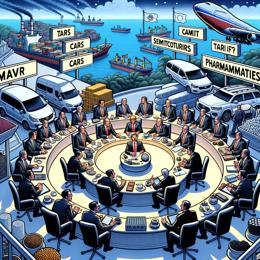Image created with AI
Sanco Expels Jacob Zuma, Deepening Tensions Within ANC Alliance
In a move signaling deepening rifts within South Africa's ruling alliance, the South African National Civic Organisation (Sanco) in KwaZulu-Natal has officially expelled former President Jacob Zuma from his role as provincial chairperson. This decisive step comes shortly after the African National Congress (ANC), the country's leading political party to which Sanco is an ally, provisionally suspended Zuma for his involvement with the rival uMkhonto weSizwe (MK) party.
Zuma, who served as South Africa's controversial head of state from 2009 to 2018, was selected as Sanco's provincial chairperson in the previous year, a testament to his enduring influence in regional politics. His subsequent advocacy for the MK party, procured through an announcement last December where he pledged to forego supporting the ANC in the looming elections, caused a stir within the political terrain. Amid these declarations, Zuma took active steps, engaging in a campaign trail that went through KwaZulu-Natal, Gauteng, Mpumalanga, and the North West to champion the MK party's cause.
The ANC has already weighed in on the emergence of the MK party, lodging a legal challenge with the Electoral Court against the use of the "MK" nomenclature, citing historical ownership linked to the ANC's armed wing formed in 1961. Far beyond a mere semantic dispute, this battle is set for a court hearing on March 19 and reflects broader contentions over legacy and influence.
In a striking public announcement last Friday, Sanco laid bare its decision to sever ties with Zuma, citing his failure to participate in organization meetings and implied dereliction of duties. This expulsion preempts the ANC's manifesto launch, a highly anticipated event scheduled to take place in Durban, and underscores the internal discord surfaced during the ANC National Executive Committee meeting in Boksburg.
In an interim arrangement, Sanco has appointed Lawrence Dube as the acting chairperson, decisively shifting its support to the ANC for the 2024 elections, and solidifying the organization's stance amidst the current power struggle. This shift may carry significant weight as KwaZulu-Natal remains a critical battleground for electoral success.
As the political landscape prepares for the manifestations of these divisions in upcoming elections, the ANC's posture towards Zuma's suspension—notably eschewing immediate punitive action—suggests a strategic containment approach in which internal politics have been temporarily shelved to ensure a united front during the electoral campaign. With Sanco's firm decision, however, this unity appears increasingly fragile, and Zuma's faction within the alliance is left to reassess its strategy in the face of growing opposition.
Longitudinal political fault lines within the ANC and its alliance are surfacing robustly, hinting at an uncertain path ahead. This ongoing saga encapsulates the challenges facing South Africa's political establishment as it grapples with leadership, allegiance, and direction in a continually evolving post-apartheid landscape.










